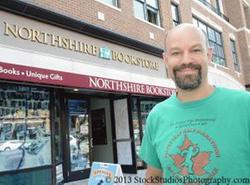At a large-store roundtable discussion at a Winter Institute several years ago, Mitchell Kaplan, owner of Books & Books in Miami, Fla., realized that something was amiss with the traditional inventory model. "The first order of discussion was how to make your store look full when you don't have a lot of inventory in it," recalled Kaplan. "These were some of the biggest, best stores in America. They should be filled to the brim with books."

|
|
| Kaplan | |
For Kaplan, a partial answer to this problem lies in consignment buying, which he and some other indie booksellers have been experimenting with increasingly. In this model, booksellers are billed only for stock that they sell.
"You're never confronted with the question of 'should I pay for it or return it,' " explained Kaplan, who works with some 25 publishers on consignment. "It creates more of a partnership. You're able to make buy decisions more rationally based on what you think you can sell. You can also then more easily take advice from publishers when they want to promote something in greater quantity, without having to worry about the effect it will have on your payable. And it brings everybody closer to the profit."
The first consignment account for Boulder Book Store in Boulder, Colo., was with Sounds True, a local small press that began as an audio publisher. "I approached them because they're local," recounted Arsen Kashkashian, Boulder Book Store's head buyer. "I talked to them about it being a partnership. With consignment we could display a lot of their stuff, rather than buying things in ones or twos. It doubled our business with them; it's been a very successful partnership."
Shortly after partnering with Sounds True, Boulder Book Store began partnering with Chelsea Green Publishing, whose books focus on sustainability and the environment. Boulder Book Store's consignment program has since expanded to include 10 bays of books, with each bay filled with books from a single publisher.

|
|
| Kashkashian (photo: literarylines.com) |
|
"There are benefits to grouping all of a publisher's books together," Kashkashian said. "We wouldn't want to do the whole store that way, of course, but for presses with a specific mission it does have an appeal."
He added that consignment makes it easier to fill the 20,000 square feet store with as many new books as possible, as opposed to used books or remainders. "For us, compared to a smaller store, consignment seems a little more critical," Kashkashian added. "If I'm trying to fill the store and I'm on a budget, it's a lot more doable with consignment."
Chris Morrow, co-owner of Northshire Bookstore in Manchester Center, Vt., began acquiring some merchandise on consignment some five years ago. The first supplier with which he partnered was a children's clothing line.
"We felt [they] needed wide representation to sell well, but we didn't have the money to devote to it," said Morrow, who estimates that about 7% of his current inventory, including sidelines, is on consignment. The children's clothing supplier remains his biggest consignment partner.
 |
|
| Morrow | |
He described the benefits of consignment--bringing in more stock and being able to keep that stock for longer periods of time--this way: "It ain't rocket science. If we have it, we have a better chance of selling it."
Some 21 stores take part in Chelsea Green Publishing's consignment program, which has been operating since 2010. According to Michael Weaver, the press's trade and export sales manager, consignment is not something that would work with every indie, at least not in the way that Chelsea Green operates. The details can vary from store to store, but each store has to have a stand-alone Chelsea Green section. Beyond that, the publisher leaves merchandising and management entirely to the booksellers.
Consignment programs "can result in a lot of inventory that doesn't sell, and that's in no one's interest," Weaver said, but "as we have it construed, it works well, because of the niche of our books and the communities of the stores we partner with. It's also easier for us because we distribute everything ourselves. There's some resistance on the part of publishers, because it's a hassle to manage different inventory systems. So publishers have tried to respond to booksellers' needs in different ways. From our point of view, a pure consignment program wouldn't work."
Morrow, too, cautioned that consignment is not a "cure-all," but felt that where appropriate, more booksellers should adopt it. "The billing and accounting can be difficult for some publishers, depending on their internal systems," he said. "It can be a little more work for the bookstore to set up a consignment system initially, but it is worth it, we find."
Kashkashian is trying to get other publishers on board with consignment. "For small or medium size presses, it can definitely work," he said. Working with major publishers, though, would generate problems. "Obviously it would have to be different for big presses; we're not going to give Penguin 72 of our bays or whatever," Kashkashian said, and advocated a kind of modified consignment model. "With big presses, I'm finding that if you can get dating extended far enough--nine months or a year--it's effectively consignment," he said. "We can carry everything, make the store look good, but we're not out on a limb financially."
Kaplan believes that the wider adoption of the consignment model would be a "game changer" for the book business, but he acknowledged possible stumbling blocks. Most of them, he said, had to do with publisher systems and entrenched methods. Another issue was one of perception; consignment is simply not perceived as the way to do things. Other industries, and bookstores in other parts of the globe, could serve as models.
"Each store has to decide what's appropriate," he said. "It's not something you put on autopilot; buying decisions still need to be made. But the bottom line is it wouldn't be viable but for the fact that it increases sales. I see triple-digit sales increases when you go to this model. Consignment is one way indies can survive and thrive." --Alex Mutter

